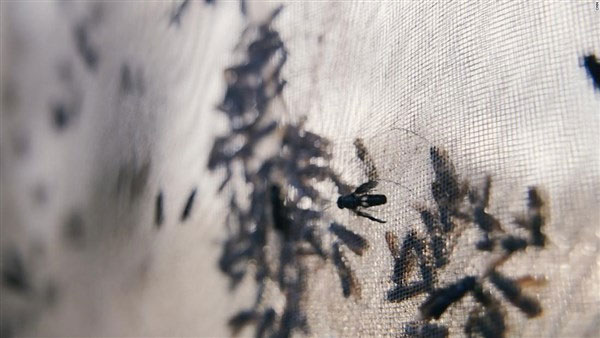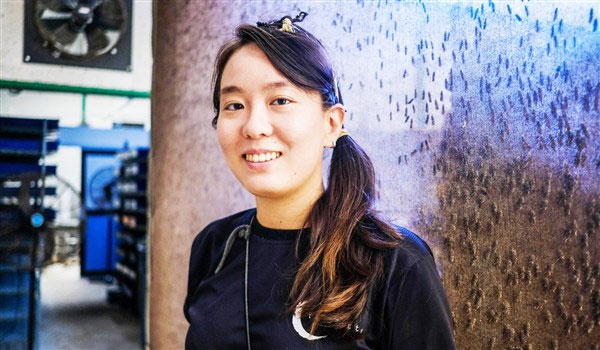Chua Kai-Ning spends a significant amount of her day ensuring that her animals are well-fed and growing rapidly.
However, she is not an ordinary farmer, and these are not ordinary animals.
Changing Perspectives on Waste

Black soldier flies do not sting and grow very quickly, making them an ideal insect for urban agriculture.
Chua and her partner, Phua Jun Wei, founded the startup Insectta in 2017. They are tackling Singapore’s food waste crisis with the help of an ally that few might think of: the black soldier fly.
Chua stated that the idea behind Insectta is to have no waste. “Waste can be reimagined as a resource if we change our thinking about production methods and how we deal with waste,” she said.
In 2020, Singapore generated 665,000 tons of food waste, but only 19% of it was recycled. Chua noted that the company provides food for black soldier fly larvae, utilizing up to 8 tons of food waste each month, including by-products from soybean processing and breweries, such as soybean meal and spent grains.
Subsequently, Insectta can dry the larvae into animal feed and convert the waste from these insects into agricultural fertilizer.
While there are many companies using insects for waste management, including Goterra, Better Origin, and AgriProtein, Insectta is extracting more agricultural products from black soldier flies.
With funding from the Trendlines Agrifood Fund and government grants, Insectta is sourcing high-value biomass materials from the by-products of these larvae.
From Insects to Biomaterials

Ms. Chua Kai-Ning co-founded the black soldier fly larvae farm Insectta.
Ms. Chua told CNN: “During our research and development process, we realized that many valuable biomaterials with market value could be extracted from these flies. The company hopes its biomaterials can revolutionize the growing insect-based product industry and change how we view waste.”
As the black soldier fly larvae mature into adults, they form a pupa and, after about 10 to 14 days, become adult flies. Insectta has developed proprietary technology to extract biomaterials from the outer shells they leave behind.
One of these biomaterials is chitosan – an antibacterial substance with antioxidant properties that is sometimes used in cosmetic and pharmaceutical products. Insectta aims to produce 500 kg of chitosan daily and is collaborating with Spa Esprit Group, based in Singapore, to use chitosan in moisturizers.
Insectta is also partnering with the mask brand Vi-Mask. The company hopes to use chitosan from black soldier flies to create an antibacterial layer in its products.
Currently, Vi-Mask uses chitosan from crab shells to line its masks. The company states that switching to insect-based chitosan is an environmentally friendly move, as Insectta’s chitosan is derived from a more sustainable source.
Sustainable Biomaterials
According to Thomas Hahn, a researcher at the Fraunhofer Institute for Biotechnology in Germany, crab shells are one of the primary sources of chitosan. Mr. Hahn has researched insect-based chitosan production with chemical engineer and biologist Susanne Zibek. Ms. Zibek noted that chitosan can replace thickeners and synthetic preservatives in cosmetics.
Extracting chitosan from shellfish involves chemical processes and large amounts of water. Ms. Chua mentioned that Insectta’s extraction techniques use fewer chemicals, such as sodium hydroxide, compared to traditional extraction processes, making it a more sustainable alternative.
Ms. Zibek stated that the market for insect-based biomaterials will grow as companies seek to reduce their environmental impact. She noted a shift in consumer awareness, with people wanting sustainable products. “We can support that by replacing synthetic products with chitosan,” she said.
Overcoming Prejudice
To expand the market for black soldier fly materials, Insectta needs to overcome prejudices against insects. Ms. Chua said that when people think of larvae, they first think of them as disgusting and harmful to humans. However, by highlighting the benefits that these insects bring, the company can change people’s stigma.
There is an ongoing scientific debate about insect consciousness. However, raising black soldier flies is more humane and sustainable compared to livestock farming, as insects require less water, energy, and space to grow.
Instead of operating their own farms, Insectta plans to sell eggs to local black soldier fly farms and collect their shells from these farms to extract biomaterials later.
“We not only want insects to feed the world, but we also want insects to power the world,” Ms. Chua stated.


















































